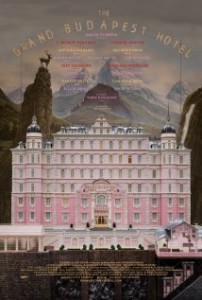The Grand Budapest Hotel – 3.5/5 – Movie Reviews by Ry!
 The Grand Budapest Hotel – 3.5/5 – I have said this before in a previous review; Wes Anderson films are the kind of films that have a specific niche. There’s a certain uniqueness in his films; one that has a specific appeal to a certain audience. With that specific nature, his films standout from the crowd, delving deeply into the imagination. With his new film (The Grand Budapest Hotel) the imagination is pushed to the limits, and what you get here is a lot of colorful scenarios, which will sometimes hit or miss in its execution. Overall, The Grand Budapest Hotel will provide a whimsical experience, but only for those who have a great imagination.
The Grand Budapest Hotel – 3.5/5 – I have said this before in a previous review; Wes Anderson films are the kind of films that have a specific niche. There’s a certain uniqueness in his films; one that has a specific appeal to a certain audience. With that specific nature, his films standout from the crowd, delving deeply into the imagination. With his new film (The Grand Budapest Hotel) the imagination is pushed to the limits, and what you get here is a lot of colorful scenarios, which will sometimes hit or miss in its execution. Overall, The Grand Budapest Hotel will provide a whimsical experience, but only for those who have a great imagination.
Premise: Through one man’s tale, and another’s imagination, we witness how one hotel of luxury becomes a place of truth, love and a meaningful place to live.
When it comes to the acting, it’s a who’s who list of actors. To list the most important cast members, you have:
Ralph Fiennes M. Gustave
F. Murray Abraham Mr. Moustafa
Mathieu Amalric Serge X.
Adrien Brody Dmitri
Willem Dafoe Jopling
Jeff Goldblum Deputy Kovacs
Harvey Keitel Ludwig
Jude Law Young Writer
Bill Murray M. Ivan
Edward Norton Henckels
Saoirse Ronan Agatha
Jason Schwartzman M. Jean
Léa Seydoux Clotilde
Tilda Swinton Madame D.
Tom Wilkinson Author
Tony Revolori Zero
Collectively, you get a group of actors/actress that gives us vibrant and distinct individuals. Each character created stands out when they are on screen, no matter if they have the main focus or are supporting characters. You see they give us very astute but witty dialogue, while their interactions come over very realistic, even when the situations are either over-the-top or unbelievable. The two that have the best chemistry on screen are Ralph Fiennes and Tony Revolori. In their relationship, you get a sense of a ‘father/son’ complex, one that grows over time and endears the trials and tribulations they face throughout the film. You get a sense there’s a wise presence between the two, seeing a realistic aurora being formed in this surreal story.
The direction of this film follows a linear story based on flashbacks. Where Wes Anderson’s touch is felt is through the conceptual story develop and script. When the film begins, we get introduced to the composer of the story, as well as whom the story is based on. We get a unique prologue (as the banter is told two fold). The first part is the introduction, and the second part is the premise of the intro through the ‘flashback’ story. Littered, very subtly, is the built up of the imaginary of the storytelling. This intriguing two fold path with the imaginary helps provides that ‘stamp’ of a Wes Anderson film, while directing through standard storytelling. This proof comes once we get pass the prologue, and the ‘flashback’ scenario comes forth. Here, you get things told back through specific ‘chapters’ as each situation has a whimsical use of rich characters and abstract scenes. There are 5 chapters within the ‘flashback’, as you learn the history of the Budapest Hotel, along with the rise and fall of people involved with that hotel. As the film progresses, the direction of that specific ‘niche’ is found through the awkwardness of the story, and how everything evolves from the relationship formed between Zero and M. Gustave. The story will have its own meaning to the audience, while most of this film is a conceptual situation built from descriptions of one man’s tale. That is both a plus and minus for this particular film. Being built from a single perspective, the outrageousness that Wes Anderson throws in can cause a dysfunction that numbs the senses. When that happens, you lose connection to the characters, and seemingly loose any proof of a raw story. That leaves a lot of hollow situations, where there is a real lack of substance to film. Even though this happens frequently, the situations are still comical, and you’re brought back in by the character relations and dialogue. Once the film hits its third act and climax, it’s a bittersweet ending. The ending of the film brings closure to one man’s journey, but also provided a meaningful heartfelt situation for those who experienced it.
When it comes to a Wes Anderson film, the visuals are where a lot of his strengths lie. This film is built off its vast and creative sets; from the creation of the hotel to the areas the characters visit, you feel real artistry throughout. No matter if scenarios are ‘over-the-top’ or ‘grounded’, the creations of the set pieces help provide a focal point for everything to happen. The score is up and down, but for the most part it helps prop the film at certain points.
Overall, The Grand Budapest Hotel puts on display what the imagination is to a man like Wes Anderson. There are times when the film gets lost in this unique world, but when it gets brought back into focus, it is a lavishing display of color and intrigue. If you’re a fan of Wes Anderson, check this film out. You will not be disappointed.